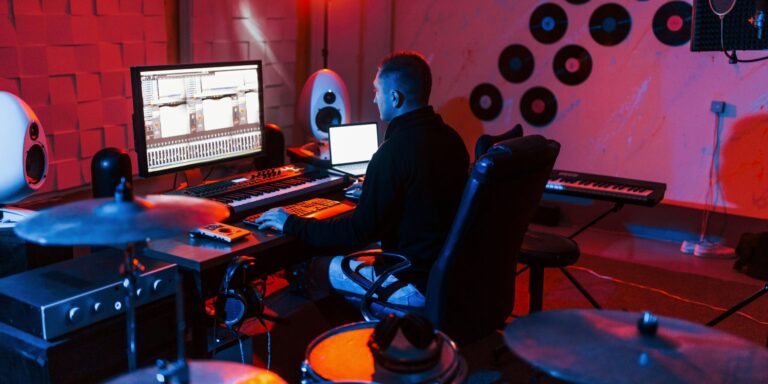Artificial Intelligence (AI) is revolutionizing industries worldwide, and the music industry is no exception. From AI-generated compositions to music production software that mimics famous artists’ styles, technology is changing how music is made and consumed. But does this innovation benefit musicians, or does it undermine the authenticity of artistic expression?
Empowering Independent Artists
AI’s most significant impact on the music industry is the accessibility it provides to independent musicians. Traditionally, producing high-quality music required expensive equipment and professional studios, which many artists couldn’t afford. But now, tools like Amper Music and Aiva enable anyone with a computer to create original compositions quickly.
These AI platforms allow musicians to generate tracks by simply inputting parameters such as mood, genre, and instrumentation. This means aspiring artists can produce high-quality music without needing expensive resources. AI even learns from popular trends, helping musicians craft more marketable songs.
In addition to production tools, AI helps independent musicians gain exposure. With platforms like Spotify and YouTube, musicians can share their creations globally, bypassing traditional barriers like record labels and promotion costs. In this sense, AI empowers artists, especially those with limited resources, by democratizing music production and distribution.
The Risk of Mass-Produced Music
While AI provides valuable tools for independent artists, it also introduces risks. One of the biggest concerns is the potential for mass-produced music that lacks the depth of human-created compositions. Music is not just about sound; it’s about emotion, culture, and personal experiences. These elements are challenging for AI to replicate.
AI-generated music often sounds polished but can feel robotic and formulaic, as it relies on algorithms and patterns rather than human intuition. For example, AI systems like OpenAI’s Jukedeck and Soundraw can generate tracks across various genres, but they often miss the unique emotional qualities that listeners crave in music.
The concern is that AI could flood the market with similar-sounding songs, making it harder for truly innovative and authentic artists to stand out. While AI can assist in creating music, it could also result in an overabundance of tracks that feel less meaningful, reducing music’s emotional impact.
Can AI Replace the Artist’s Soul?
A central debate surrounding AI in music is whether it can replace the “soul” of the artist. Music has long been an expression of personal experience, emotions, and cultural context, and many argue that AI cannot replicate this. An artist’s individual journey shapes their music, and it’s this raw, human connection that makes a song resonate.
AI, by contrast, works by analyzing data and creating patterns. While it can generate music that sounds good, it struggles to capture the emotional depth and cultural significance that humans infuse into their art. AI cannot experience the world as humans do, and this disconnect raises questions about whether its music can ever be truly authentic.
That said, some argue that AI doesn’t have to replace human artistry—it can enhance it. Just as synthesizers revolutionized music in the past, AI can now serve as a tool for artists to experiment with new sounds and ideas. In this way, AI may become another instrument in an artist’s creative toolkit rather than a replacement for their soul.
AI Collaborations: A New Frontier for Creativity
Despite concerns, AI is already being used successfully in collaboration with musicians. For example, the British band The Wombats used AI to help create their song “Method to the Madness.” The band still wrote the lyrics and made key artistic decisions, but AI played a role in suggesting musical ideas. This collaboration shows that AI can serve as a creative partner, rather than simply a tool for production.
Similarly, artist Holly Herndon has embraced AI as a collaborative force in her music. Her 2019 album PROTO blends human creativity with AI-generated elements to explore the relationship between humans and machines. Herndon’s approach demonstrates that AI can be used to push artistic boundaries and experiment with new forms of expression, rather than replacing the artist entirely.
The Future of AI in Music
Looking ahead, AI’s role in music will continue to evolve. As AI technology improves, we may see even more innovative applications in music production, from advanced composition tools to enhanced listening experiences. However, the key to ensuring AI’s impact is positive lies in how it’s used.
AI should be viewed as a tool for enhancing creativity rather than replacing it. While AI can help artists refine their work, it’s unlikely to ever replace the unique, emotional connection that humans bring to their music. The future of music will likely involve a combination of human creativity and AI-driven innovation, with technology serving as a valuable partner rather than a competitor.
Ultimately, AI’s place in music should be seen as an opportunity for collaboration and exploration. The question isn’t whether AI will dominate the music industry, but how musicians choose to integrate it into their creative processes. If used thoughtfully, AI can be a blessing for artists, helping them push the boundaries of what’s possible while still maintaining the emotional depth that makes music so powerful.


